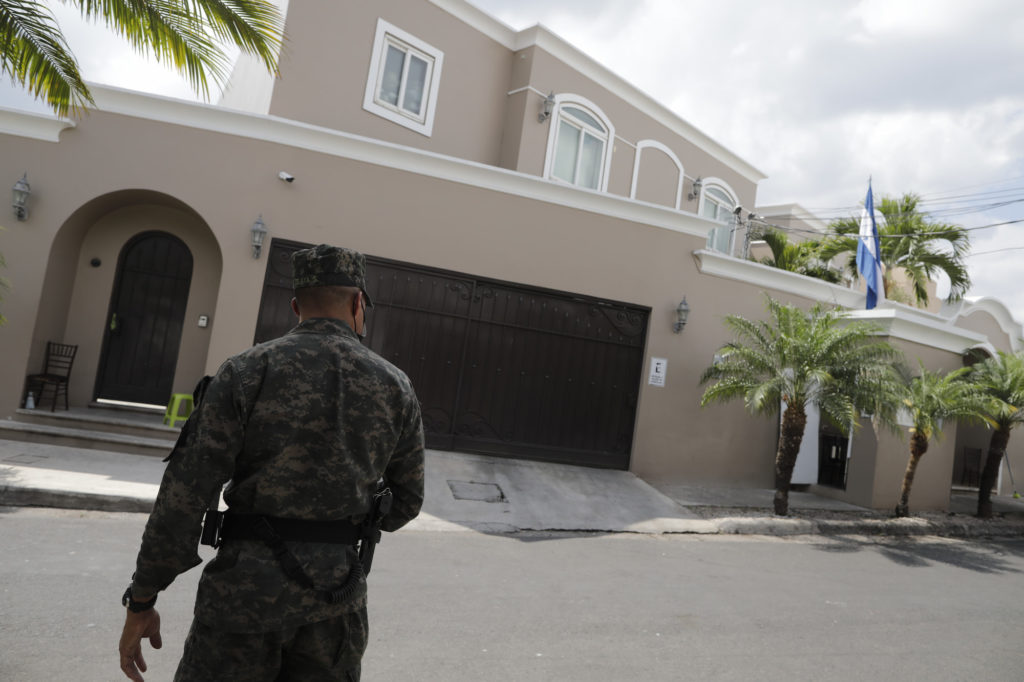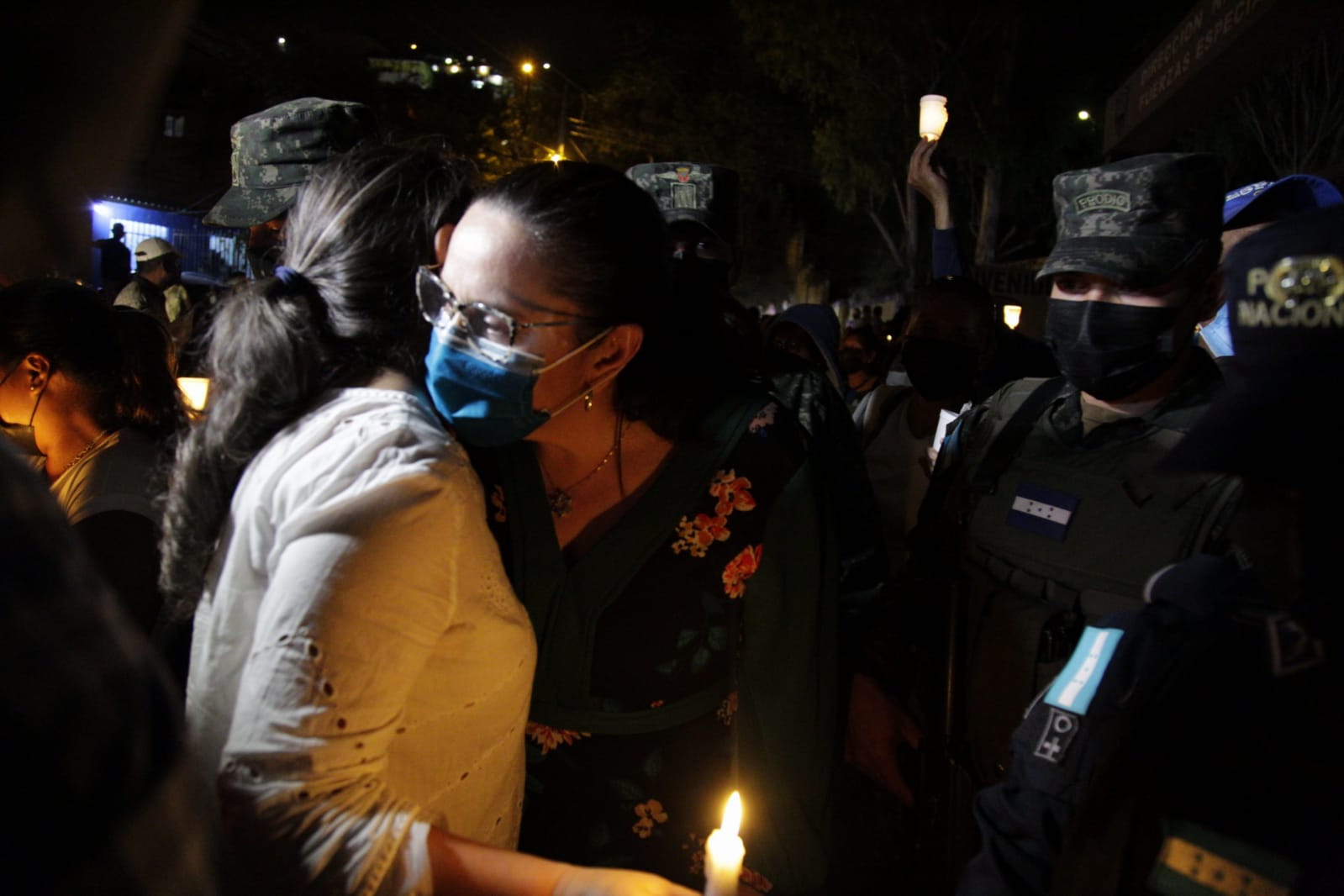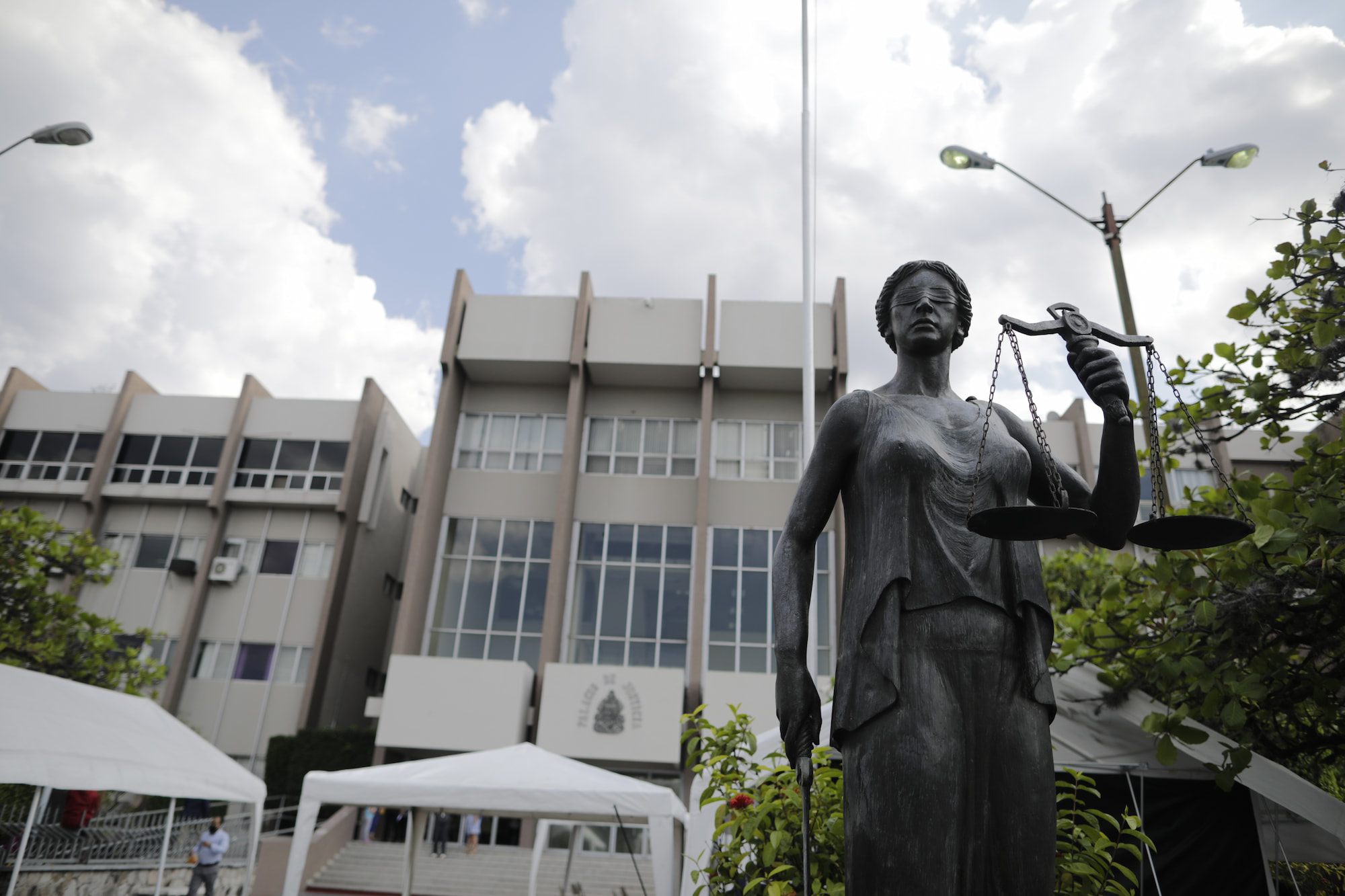This article was originally published in Spanish on April 01, and was translated on April 20, 2022
A judge authorized the seizure of 33 properties, eight businesses, 16 vehicles, and other financial assets from former president Juan Orlando Hernández’s family. However, this represents less than half of Hernández’s $7.8 million net worth.
Recent news reports said that the former first lady sought to protect some of their wealth by transferring US$2.44 million in personal assets to a local bank, allegedly to repay a debt. This asset transfer temporarily prevented the Justice Ministry from seizing these assets, while prosecutors investigate whether the bank and Ana García de Hernández acted in good faith.
By Leonardo Aguilar
Photos by Fernando Destephen and Jorge Cabrera
A judge has prohibited any transactions pertaining to the physical and financial assets seized from former president Hernández and his family. The freezing of these assets came several weeks after another judge authorized the extradition of Juan Orlando Hernández on March 16, a delay that Attorney Juan Carlos Aguilar believes happened because, “The courts and the Justice Ministry are still part of an institutional structure that was co-opted by Juan Orlando Hernández. They acted much more quickly [to seize assets] in the Rosenthal case.”
On April 1, 33 properties owned by the Hernández family in the departments of Francisco Morazán, Olancho, and Lempira were seized, along with eight businesses, 16 vehicles, and financial assets.
In March 2021, former National Party congressperson Antonio “Tony” Hernández ─ the former president’s brother ─ was sentenced to life in prison by a U.S. court. However, it took a long time for the Honduran government to seize some minor assets belonging to Tony Hernández, despite his conviction for large-scale drug trafficking.
The Honduran Supreme Court and the Attorney General worked closely with Juan Orlando Hernández during his two presidential terms. Their seven-year terms will end next year, and there is talk in the National Congress of impeaching them for colluding with the former president.
The former president’s wife
On March 30, former first lady Ana García de Hernández participated in a vigil outside the Special Forces facility where her husband has been held since his February 15 arrest. The Honduran Supreme Court has authorized his extradition to the United States to face drug trafficking and weapons charges.
But Ana Garcia hasn’t been idle. The National Anticorruption Council (Consejo Nacional Anticorrupción – CNA) charges that she recently tried to shield some of the family’s assets before they could be seized by the government.
“While the former first lady was praying for her husband, she was also bargaining to protect her assets and settle some debts,” José Luis Moncada, a former president of the National Banking and Insurance Commission (Comisión Nacional de Bancos y Seguros – CNBS) told Contracorriente.
The CNA exposed an asset transfer that is now putting the country’s financial system, the courts, the CNBS, and the Justice Ministry in the spotlight. They are institutions responsible for discovering, seizing, and ultimately forcing the Hernández family to forfeit these assets if it can be proved they were obtained illegally. The assets in question will be administered by the Office for the Administration of Seized Assets (Oficina Administradora de Bienes Incautados – OABI).
An investigation by the online media outlet Criterio.hn revealed that the Hernández García family owned almost 60 properties and seven companies valued at nearly US$7.8 million, in Tegucigalpa, Lempira (central Honduras), and Olancho (eastern Honduras). The investigation scrutinized 12 years of public records, starting in 2010 when Hernández became president of the National Congress.
A statement issued by the Justice Ministry stated that any assets transferred by Ana Garcia to a financial institution were not subject to seizure because “the involvement of an innocent third party acting in good faith must be considered. However, investments and improvements to the other assets fall within the period under investigation and therefore represent a comingling of capital.”
Aguilar believes that the Ministry of Justice should conduct “a financial investigation to determine whether [the Hernández García family] did in fact have a debt due, or whether the bank is allowing itself to be used to shield these assets.”
José Luis Moncada says that the transfer of real property to pay off debt is normally quite straightforward, “Someone who owes a debt can turn over a real property to pay it off, even if there is a mortgage on that property.”
He thinks that Ana García made this transfer “before the Supreme Court approved the extradition of the former president. That is, the Honduran government had not yet determined that there was sufficient evidence for him to be tried in the U.S.” Moncada added that the transaction was conducted quietly because it involved an ex-president, and “at that time, the bank was not subject to any legal restrictions.”
Economist Nelson Ávila argues that debt payoffs using real properties must correspond to an existing loan to the entity that owns the real properties.
“There has to be an existing debt and the related debt collection activity by the lender,” says Ávila, adding that, “Without these elements, then the transaction is nothing more than an agreement between parties to protect each other. But that’s what typically happens, especially when the transaction occurs before an impending asset seizure operation. A financial institution that participates in this transaction is colluding in asset laundering because it’s obvious that the other party is in legal trouble and expects to recover its resources in the future. Who are they harming? Well, they’re harming the country because the government should be seizing those assets. Instead, part of the nation’s wealth is disappearing.”
Ávila says that banks that grant mortgages to people linked to drug trafficking “must be subject to the law. If such a transaction occurs right before the mortgaged asset is to be seized, then the transaction should be considered a criminal act.”
Read:Complexities and politics of extradition revealed as Honduras` ex-president to be delivered to U.S.
Honduran economist Claudio Salgado says that for a financial institution to accept a real property to satisfy a debt, it must first determine whether the real property is properly registered, and then it should investigate the provenance of the property. The financial institution must go beyond a legal assessment and determine whether the property was obtained normally or not.
“Obviously, once the bank has evaluated all the possible risks, it can decide whether to accept [the property as payment] or not,” he said.
José Luis Moncada says that the CNBS is an autonomous unit of the Executive Branch with its own budget. When it was first created, the intent was to establish a technical entity, similar to the Central Bank of Honduras, but it has become somewhat politicized since the commission’s term coincides with the president’s term.
“The CNBS needs to have an objective and totally independent management team, staffed by professionals who are experts in the subject,” says Moncada.
He argues that the law governing the CNBS needs to be reformed to ensure the commission’s political independence. “The financial sector isn’t the only avenue for laundering drug money. Drug traffickers also build buildings and invest in businesses, retail outlets, and livestock. There are many ways to launder illegal income,” he said.
The financial system and its role in drug trafficking
In October 2015, the U.S. Treasury Department began curtailing Banco Continental’s transactions and activities. The U.S. Office of Foreign Asset Control (OFAC) stated that all liquidation and closure activities and transactions pertaining to the Rosenthal family should be concluded by December 12, 2015, 12:01 a.m.
Honduran authorities quickly seized nearly 20 companies and homes belonging to the Continental financial group. Days later, the CNBS initiated the closure of Banco Continental, claiming that it was following a U.S. Treasury Department directive after it was alleged that the bank was used to launder drug money.
In August 2020, Yani Rosenthal returned to Honduras to run for president after serving a three-year sentence in the United States for participating in the laundering of drug money from the Cachiros cartel, a criminal organization that had secured several government contracts. According to Rosenthal’s legal team, OFAC removed him from its blacklist in March 2022.
Claudio Salgado notes that the U.S. had charged Banco Continental with facilitating the laundering of assets, and not the direct laundering of assets. “They allowed their businesses to be used for laundering, in knowing full well the sources of the laundered assets. That was the OFAC allegation against Banco Continental,” he said.
Salgado said that when OFAC kicked off a review of all of Banco Continental’s operations, the CNBS acted to suspend the bank’s operations and proceeded with its liquidation.
“When OFAC comes after you, you become a dead man walking, financially speaking,” said Salgado. He claims that Banco Continental had a very low capitalization, which should always be above 10% for a bank.
“If I remember correctly,” said Salgado, “when the bank was stripped of its assets, it fell below this 10% capitalization level. Honduran law states that when an institution falls below the CNBS’ recommended capitalization level, it must be liquidated.”
He says that a certain group of people conducted irregular transactions with Banco Continental. “This group received payments in checks, which were then deposited in a financial institution that knew the provenance of the funds represented by those checks. And they also knew who the depositors were,” said Salgado.
However, Salgado acknowledges the difference between directly laundering assets and allowing a bank to be used to launder assets, “You can’t claim that they [the Rosenthals] were directly laundering assets because that implies receiving money from dubious sources, and a government is not a dubious source.”
When asked whether the dismantling of a financial network linked to drug trafficking can improve a government’s finances or whether it can have catastrophic consequences instead, Salgado admitted that this is an ongoing debate.
Regardless, drug trafficking has undesirable consequences for any society. “When a country has a large drug trafficking presence, these people soon take over its main public offices and then infiltrate the courts, the police, the armed forces, and the justice system. And they can even take over the presidency, which is the worst-case scenario because then the government itself begins promoting illegal activity,” Salgado said.
An investigation by the Center for Democracy Studies in Honduras (Centro de Estudio para la Democracia – CESPAD) titled “The silence of the banking system about the money that the corrupt deposit in the banks of the country” found that the now-defunct Support Mission Against Corruption and Impunity in Honduras (Misión de Apoyo Contra la Corrupción y la Impunidad en Honduras – MACCIH) found a common thread in more than 10 corruption cases (including one case of narco-politics): in each case, no less than US$14.3 million was deposited in the banking system.
Ávila told Contracorriente that the CNBS is tasked with preparing regular reports on the current state of the Honduran financial system and on illegal banking activity so that Honduran authorities can take action against criminals and people who are violating the public trust integral to a bank’s mission.
Regarding the inconsistent responses by the Ministry of Justice and the courts, Ávila said, “They haphazardly close down some financial activities and harass political adversaries, yet they protect others ─ their friends ─ as if the law doesn’t apply to them.”
He believes that the Honduran financial system has been totally co-opted by drug traffickers and a president who, according to U.S. prosecutors, turned Honduras into a narco-state, “The U.S. prosecutors who have been investigating this since 2004 arrived at that conclusion, especially after 2013. They know that Honduras has become a narco-state.”
Ávila says that the financial system isn’t the only sector that should be monitored ─ the National Property Institute bears watching as well.
President Castro’s communications advisor, Milton Benítez, tweeted that the Hernández family had recently made some property registration changes with the National Property Institute.
“Ebal Diaz was in charge of the National Property Institute for a time, so a forensic investigation should be conducted of all the transactions involving communal land and government-owned property. The institute is where they got all the information to create the Employment and Economic Development Zones (Zonas de Empleo y Desarrollo Económico – ZEDE), which is the framework for establishing these states within a state, and for operating narco-states supported by other foreign parties,” said Ávila.
He believes that a full investigation of all these transactions should be conducted because some of them involved “transfers of public property ─ national territory ─ to private individuals.”
Drug traffickers need the financial system to attain the “benefits” of their illegal activity, says Ávila, “because they need to legitimize their illegal activities.” Asset laundering turns illegal gains into seemingly legitimate business income, which is where “the banking system comes into play,” he says.
Financial institutions engage in what’s called “loan capture,” he said. They charge a commission to take in dirty money and then lend it to legitimate businesses. The money moves through the system without any investigation into the sources of the funds.
“This is how corrupt financial systems have become fundamental to funds legalization or money laundering. It happens all over the world and Honduras is no exception,” said Ávila. He claims that it’s impossible for drug traffickers to manage their millions without the complicity of the banks.
“It’s almost impossible,” he said, “because all of the entry and exit transactions [through the money laundering process] are done via paper checks or bank transfers.” Ávila acknowledges that, “People sometimes make direct cash payments, and those receiving that cash are totally aware that they are participating in an illegal activity.”
When asked if drug money could have filtered down into the Central Bank of Honduras, Ávila said yes, “because drug money could be intermingled with the overall deposits in a banking system. Places like Miami (Florida), Panama City (Panama), and the Bahamas were built on a money-laundering foundation.”
Moncada believes that the national banking system can take measures to avoid being used to launder dirty money from drug trafficking or other sources. He mentioned the Financial Intelligence Unit (Unidad de Inteligencia Financiera – UIF), a CNBS unit that “works very closely on this issue with the Justice Ministry and other investigators, and also with the Supreme Court and the lower courts.”
Regarding the Rosenthal family, José Luis Moncada believes that they were treated unfairly. “Other cases in the past followed due process. But the rights of the Rosenthal family were violated when their assets were expropriated before any member of that family was ever tried and convicted. It’s my understanding that OFAC and the U.S. government never requested the shutdown of Banco Continental. The [bank] owners were not the only ones affected by that. It affected the overall financial institution, its depositors, and others,” said Moncada.
Juan Carlos Aguilar says no one knows what has become of the drug trafficking assets seized in the past because “the Secrecy Law has drawn an opaque curtain over all of this. Some public information is being concealed, while other information is never even released.”








